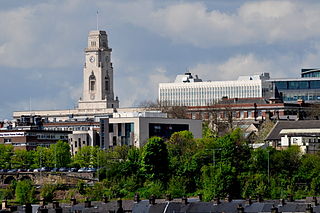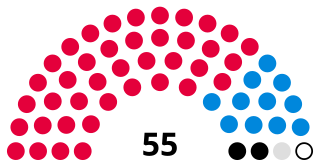
Metropolitan counties are a subdivision of England which were originally used for local government. There are six metropolitan counties: Greater Manchester, Merseyside, South Yorkshire, Tyne and Wear, West Midlands and West Yorkshire.

South Yorkshire is a ceremonial county in the Yorkshire and the Humber region of England. It borders North Yorkshire and West Yorkshire to the north, the East Riding of Yorkshire to the north-east, Lincolnshire to the east, Nottinghamshire to the south-east, and Derbyshire to the south and west. The largest settlement is the city of Sheffield.

Selby District was a local government district of North Yorkshire, England, from 1974 to 2023. Its council was based in the town of Selby. The district had a population of 83,449 at the 2011 Census. The southernmost district of North Yorkshire, it bordered the City of York unitary authority, the Borough of Harrogate in North Yorkshire, the City of Leeds and City of Wakefield districts in West Yorkshire, the City of Doncaster in South Yorkshire, and the ceremonial county of the East Riding of Yorkshire.

The Metropolitan Borough of Barnsley is a metropolitan borough in South Yorkshire, England; the main settlement is Barnsley and other notable towns include Penistone, Wombwell and Hoyland.

The Local Government Act 1985 is an Act of Parliament in the United Kingdom. Its main effect was to abolish the six county councils of the metropolitan counties that had been set up in 1974, 11 years earlier, by the Local Government Act 1972, along with the Greater London Council that had been established in 1965. In their place many single purpose authorities known collectively as 'joint authorities' were established for fire service, police and passenger transport. An ad hoc education authority was established for Inner London and a planning authority for Greater London. The legislation permitted councils to form 'joint arrangements' for waste disposal and other services that they wished to provide together. Time-limited residuary bodies were created to dispose of the assets of the former authorities.

City of Doncaster Council is the local authority of the City of Doncaster, a metropolitan borough with city status in South Yorkshire, England. Prior to being awarded city status in 2022 the council was called Doncaster Metropolitan Borough Council. The council is based at the Civic Office in Waterdale, central Doncaster. It is one of four local authorities in South Yorkshire and provides the majority of local government services in Doncaster. The council is a member of the South Yorkshire Mayoral Combined Authority.

North Yorkshire Council, known between 1974 and 2023 as North Yorkshire County Council, is the local authority for the non-metropolitan county of North Yorkshire, England. Since 2023 the council has been a unitary authority, being a county council which also performs the functions of a district council. The non-metropolitan county is smaller than the ceremonial county of North Yorkshire; the ceremonial county additionally includes Middlesbrough, Redcar and Cleveland, York and part of Stockton-on-Tees. North Yorkshire Council is based at County Hall, Northallerton, and consists of 90 councillors. It is a member of the York and North Yorkshire Combined Authority.

City of Bradford Metropolitan District Council is the local authority of the City of Bradford in West Yorkshire, England. Bradford has had an elected council since 1847, which has been reformed on several occasions. Since 1974 it has been a metropolitan district council. It provides the majority of local government services in the city. The council has been a member of the West Yorkshire Combined Authority since 2014.

The South Yorkshire County Council (SYCC) — also known as South Yorkshire Metropolitan County Council — was the top-tier local government authority for the metropolitan county of South Yorkshire from 1 April 1974 to 31 March 1986. A strategic authority, with responsibilities for roads, public transport, planning, emergency services and waste disposal, it was composed of 100 directly elected members drawn from the four metropolitan boroughs of South Yorkshire: Barnsley, Doncaster, Rotherham and Sheffield.

West Yorkshire County Council (WYCC) – also known as West Yorkshire Metropolitan County Council (WYMCC) – was the top-tier local government administrative body for West Yorkshire from 1974 to 1986. A strategic authority, with responsibilities for roads, public transport, planning, emergency services and waste disposal, it was composed of 88 directly elected members drawn from the five metropolitan boroughs of West Yorkshire. West Yorkshire County Council shared power with five lower-tier district councils, each of which directed local matters.

Wakefield Council, also known as the City of Wakefield Metropolitan District Council, is the local authority of the City of Wakefield in West Yorkshire, England. Wakefield has had a council since 1848, which has been reformed on several occasions. Since 1974 it has been a metropolitan borough council. It provides the majority of local government services in the city. The council has been a member of the West Yorkshire Combined Authority since 2014.

Barnsley Metropolitan Borough Council is the local authority of the Metropolitan Borough of Barnsley in South Yorkshire, England. It is a metropolitan borough council and provides the majority of local government services in the borough. The council is a member of the South Yorkshire Mayoral Combined Authority.

Rotherham Metropolitan Borough Council is the local authority of the Metropolitan Borough of Rotherham in South Yorkshire, England. It is a metropolitan borough council and provides the majority of local government services in the borough.

The 2022 Bury Metropolitan Borough Council election took place on 5 May 2022. Due to boundary changes, all 51 councillors were elected at the same time. The election took place alongside other local elections across the United Kingdom.

The 2022 Barnsley Metropolitan Borough Council election took place on 5 May 2022. One third of councillors — 21 out of 63 — were elected. The election took place alongside the 2022 South Yorkshire mayoral election and other local elections across the United Kingdom.

The 2022 City of Bradford Metropolitan District Council election took place on 5 May 2022 to elect one third of councillors to the City of Bradford Metropolitan District Council. The election took place at the same time as other local elections across the United Kingdom.

The 2022 Calderdale Metropolitan Borough Council election took place on 5 May 2022 to elect members of Calderdale Metropolitan Borough Council in England. One third of councillors — 17 out of 51, plus one vacancy in Ovenden ward were up for election. The election took place alongside other local elections across the United Kingdom.

The 2022 Gateshead Metropolitan Borough Council election took place on 5 May 2022. One third of councillors — 22 out of 66 — on Gateshead Metropolitan Borough Council were elected. The election took place alongside other local elections across the United Kingdom.

The 2022 Kirklees Metropolitan Borough Council election took place on 5 May 2022. One third of councillors—23 out of 69—on Kirklees Metropolitan Borough Council were elected. The election took place alongside other local elections across the United Kingdom.



















